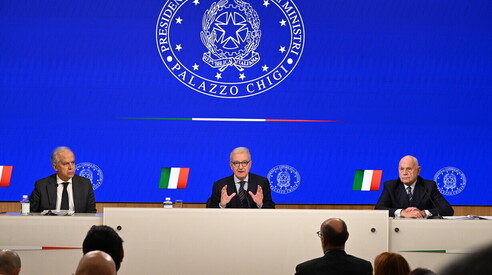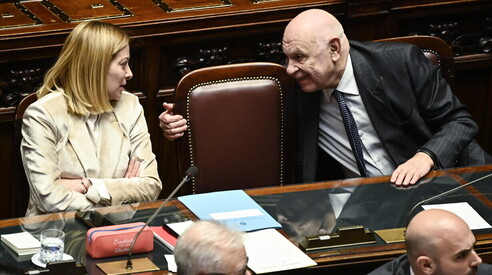The political process is over. The documents on Nordio, Piantedosi, and Mantovano are a manifesto of judicial interventionism.


ANSA photo
The director's editorial
At the same time as the Court of Ministers recognizes the separation of powers as a sacrosanct principle, it is being argued that the only person who decides what is political and what is not is always a judge, who can decide autonomously when floods are acceptable and when they are not. Dangerous confessions.
On the same topic:
At this point, the question is more than legitimate: what exactly does "flooding" mean when discussing the relationship between politics and the judiciary? To answer this question, perhaps the best way is to let a very honest judge speak. Follow the thread. In the documents sent Tuesday evening by the Tribunal of Ministers to the Chamber of Deputies' Authorization Committee, documents relating to the investigations into Minister Carlo Nordio , Minister Matteo Piantedosi , and Undersecretary Alfredo Mantovano , there is an important, and rather sensational, passage concerning a sort of confession by the judges. We are on page 88. The judges of the Tribunal of Ministers begin with an excusatio non petita, so to speak, in which they acknowledge that the judiciary must always be careful not to overstep the boundaries of the proper relationship between the judiciary and political power. The sentence is perfect: "Judges cannot be called upon to engage in politics in place of representative bodies: the regulatory principle of the separation of powers precludes this." A moment later, however, the judges change their tone, and it is clear why .

"Where, on the other hand, there is a predetermination of the canons of legality, that same review appears to be a duty. The judge, regardless of the legal system to which he belongs, is not only respectful of the scope of attribution of powers, but also, again by constitutional statute, a guarantor of legality, and therefore does not retreat where the scope of political discretion is circumscribed by constraints imposed by rules that mark the boundaries or direct the exercise of government action." And therefore: "The principle of separation of powers cannot be invoked when political action produces effects contrary to criminal law: in this case, judicial activity prevails over political activity." In essence, the judges recognize a principle: the judiciary cannot replace politics. A moment later they say that the judge, however, can freely decide, at his discretion, when the judiciary can distinguish a political act from a non-political one . And ultimately, at the same time as acknowledging the sacrosanct principle of the separation of powers, the Court insists that the decision on what constitutes a political act rests entirely in the hands of judges. This leads to the claim that the only person who decides what is political and what is not is always a judge, who can therefore decide autonomously, invoking his own subjective right, when floods are acceptable and when they are not.
The judges of the Tribunal of Ministers—who know full well that what they do not consider a political act will be validated as a political act when the request for authorization to proceed is submitted to the legislative branch—are, in other words, asserting the right to discretionary scrutiny of political acts, invoking a highly ambiguous ruling by the Constitutional Court, ruling no. 81/2012, which established that violating gender balance in a regional government, that of Campania, was an unlawful and non-political act. In doing so, they demonstrate what is plain for all to see: the Almasri case is not just a question of possible wrongdoing by ministers, but a larger issue concerning who has the final say, between the judiciary and politics, on the boundaries of what constitutes national security.
This is true when it comes to cases like Almasri 's – a case that, though largely unremarked, despite being linked to an arrest warrant from the International Criminal Court, left politicians with greater than normal margins of discretion, as happens whenever a procedure requires countries not to "execute" a decision but to "collaborate" in fulfilling a decision. But it's also true when it comes to immigration, for example, and the margins of discretion the judiciary has chosen to allow in assessing what constitutes national security and what does not (see the European Court of Justice on the issue of safe countries) are the same ones that lead judges to consider migration policies in terms of repatriation as a matter that should ultimately concern judges and not politicians, as if it were normal and routine for a government's migration policy to be subject to the discretionary assessments of every judge in Italy, and indeed in Europe. The Almasri case, therefore, perfectly reflects the short circuits that exist between the judiciary and the executive branch. But the documents sent by the Court of Ministers to the Authorization Committee are also a valuable document because they represent, in their purest form, a manifesto useful for demonstrating what many magistrates now consider an acquired right: pretending to be respectful of the confines of politics while acknowledging that ultimately it is and always will be the magistrates who decide what is and isn't politics, without realizing that there is nothing more political than wanting to discretionarily define what is and isn't a political act . This is the Republic of floods, where the only full powers that should alarm public opinion are not those of politics but, once again, those of the judiciary.
More on these topics:
ilmanifesto




